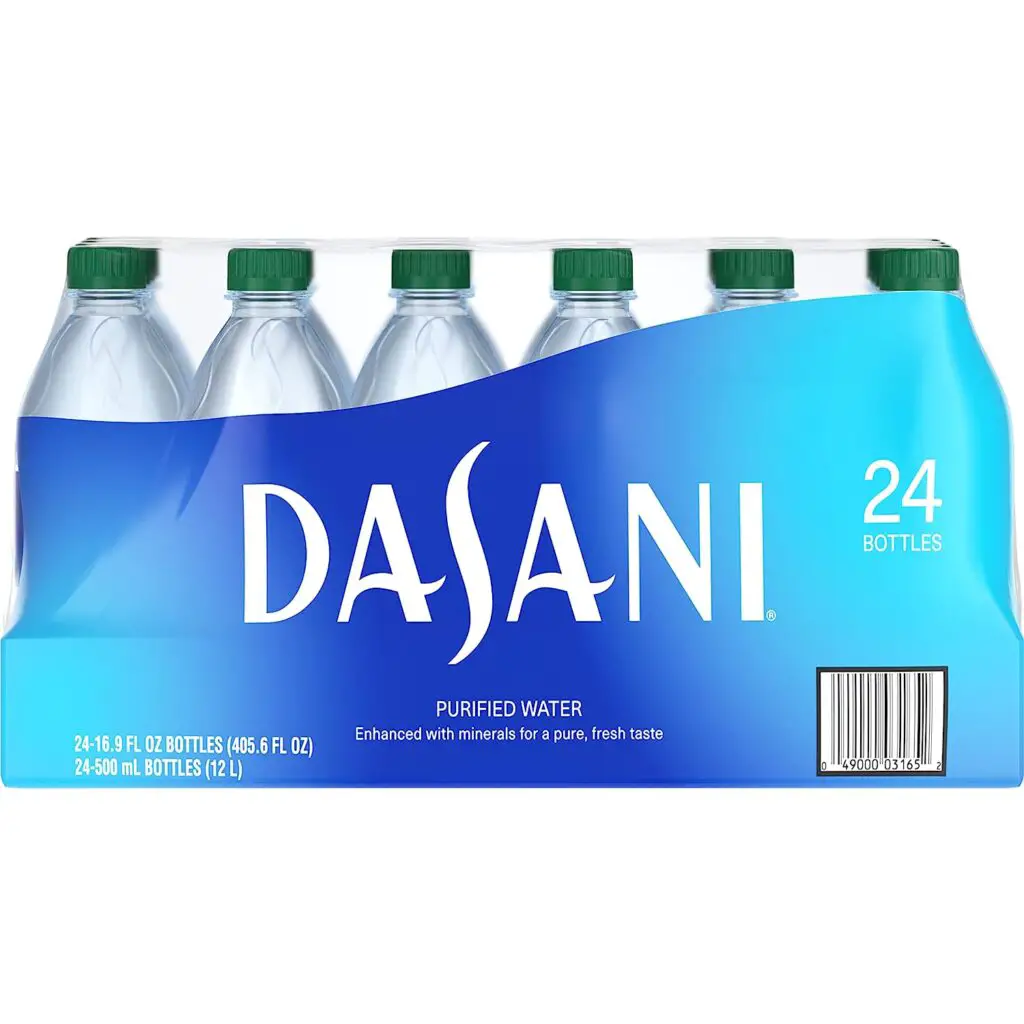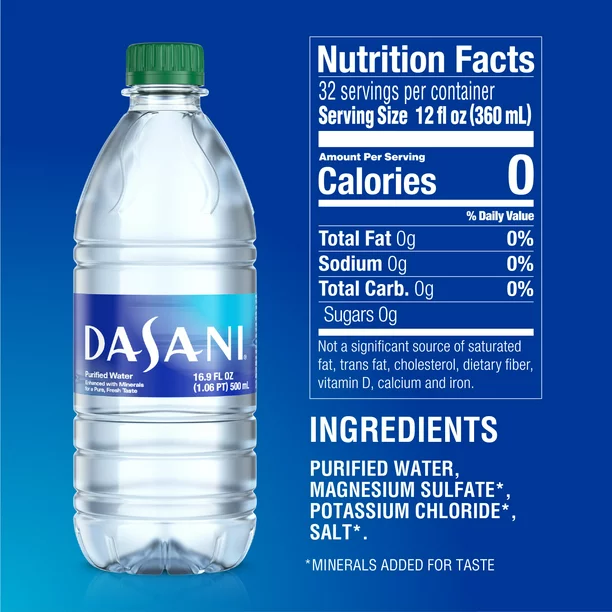Dasani Water is a popular bottled water brand that has been the subject of various controversies and concerns regarding its safety and quality. This article will provide an overview of Dasani water, discuss its controversies, and analyze the available information to determine is Dasani water bad for you.
Background On Dasani Water

Dasani Water, launched in 1999, is a bottled water brand produced by The Coca-Cola Company. The water is sourced from local municipal water supplies, undergoes a process of reverse osmosis to remove impurities, and is then enhanced with trace minerals. Dasani prides itself on providing clean and refreshing water to consumers.
However, despite its popularity, Dasani water has faced several controversies and criticisms. These controversies range from the source of the water to the additives used in its production. The controversies have led to concerns among consumers about the safety and quality of Dasani water.
Controversies Surrounding Dasani Water
- Source of Water: One of the main controversies surrounding Dasani water is its water source. Dasani water is sourced from local municipal water supplies, raising concerns among consumers who expect bottled water to come from natural springs or pure sources. However, it is important to note that Dasani water undergoes a filtration process to remove impurities before packaging.
- Additives: Another controversy surrounding Dasani water is the additives used in its production. Dasani water is treated with various chemicals, including potassium chloride, magnesium sulfate, and salt to enhance its taste. While these additives are generally considered safe for consumption in small amounts, there have been concerns about the long-term effects of consuming these additives in large quantities.
- Packaging: Dasani water is packaged in plastic bottles, which has raised environmental concerns. The plastic bottles used for Dasani water are not biodegradable and can take hundreds of years to decompose. As a result, Dasani Water has been criticized for contributing to plastic waste and environmental pollution.
- Microplastics: Recent studies have found that, like many other bottled water brands, Dasani water contains microplastics. Microplastics are tiny particles of plastic that can harm human health and the environment. The presence of microplastics in Dasani water has raised concerns about the potential health effects of consuming these particles.
It is important to note that while these controversies and concerns exist, the available scientific evidence does not suggest that Dasani water is necessarily bad for you. The additives used in Dasani water are generally safe for consumption in moderation, and the levels of contaminants in Dasani water are within acceptable limits.
However, suppose you have concerns about the environmental impact of plastic packaging or the presence of microplastics in bottled water. In that case, you may consider alternative options, such as using a water filter at home or other brands prioritizing sustainable packaging.
Ingredients In Dasani Water

Concerns have been raised about the ingredients in Dasani water and whether they harm our health. Let’s look closer at the three main ingredients added for taste in Dasani water and their potential impact on our well-being.
Magnesium Sulfate: Potential Health Effects
One of the ingredients added to Dasani water for taste is magnesium sulfate. Magnesium sulfate, also known as Epsom salt, is a non-metallic salt that is typically used in bath salts and as a drying agent. Some potential health effects of magnesium sulfate include:
- Teratogenicity: Magnesium sulfate is considered a teratogen, which means it can potentially cause embryo malformation. If administered, it has been associated with harmful effects on the fetus in preterm labor.
- Bitter taste: Magnesium sulfate is known to have a bitter taste. Adding it to water could potentially alter the flavor and make it less appealing to some individuals.
It is important to note that the concentration of magnesium sulfate in Dasani water is likely to be low, and any potential health risks would depend on the amount consumed.
Potassium Chloride: Side Effects And Concerns
Another ingredient found in Dasani water is potassium chloride. Potassium chloride is commonly used as a fertilizer and, in some cases, as an injection to stop the heart. Here are some side effects and concerns related to potassium chloride:
- Cardiac arrhythmia: Potassium chloride can cause irregular heart rhythms or cardiac arrhythmia in some individuals.
- Muscle weakness: Some individuals may experience muscle weakness as a side effect of potassium chloride.
- Gastrointestinal issues: Potassium chloride may cause symptoms like nausea, abdominal pain, diarrhea, dyspepsia (indigestion), or heartburn.
It is important that potassium chloride is naturally found in many food sources, and these side effects are typically associated with high or excessive intake. The concentration of potassium chloride in Dasani water is likely to be low, and any potential side effects would depend on the amount consumed.
Salt: Drying Agent And Its Impact On Health
Salt is the third ingredient added for taste in Dasani water. While salt is a common seasoning in food, excessive salt intake has been associated with health concerns, such as high blood pressure. Here is how salt may impact our health:
- Drying agent: Salt tends to dry out things, including water. Adding salt to water can alter the taste and potentially make it less refreshing.
- Implications for high blood pressure: Consuming high amounts of salt can increase blood pressure. High blood pressure strains the heart, arteries, kidneys, and other organs.
Overall, while concerns have been raised about the ingredients in Dasani water, it is essential to consider the concentration of these ingredients and their potential health effects. It’s always a good idea to check the labels and choose water options that best align with your health goals and preferences.
You can learn more about the potential health effects of these ingredients and make an informed decision about the water you consume by referring to studies and resources available on reputable websites like Wikipedia or consulting with a healthcare professional.
Potential Health Risks Of Dasani Water
While Dasani Water is a popular bottled water brand, concerns about its potential health risks have been raised. It’s important to understand the potential effects of the ingredients found in Dasani Water to make an informed decision about its consumption. Here are some key health risks associated with Dasani Water:
Teratogenic Effects Of Magnesium Sulfate
Dasani Water contains magnesium sulfate, which is added for taste. While magnesium sulfate is generally considered safe, it is worth noting that it is classified as a teratogen. A teratogen is an agent or factor that can cause embryo malformation. In high doses, magnesium sulfate has been shown to harm the fetus during preterm labor. However, the amounts of magnesium sulfate in Dasani Water are relatively small and within safe limits according to the U.S. Environmental Protection Agency’s standards.
Cardiac Risks Associated With Potassium Chloride
Potassium chloride is another ingredient added to Dasani Water for taste. While potassium is an essential mineral for the body, high levels of potassium chloride can have cardiac risks. Excessively high levels of potassium chloride can cause irregular heart rhythms and even stop the heart from beating. It’s important to note that the amount of potassium chloride in Dasani Water is relatively small and has been approved as safe for consumption by the FDA. However, individuals with specific health conditions, such as kidney problems or heart disease, may need to limit their potassium intake.
High Sodium Intake And Its Relationship To Health Issues
Dasani Water also contains salt, which is added to enhance its flavor. While salt is a common ingredient in food and beverages, excessive sodium intake can be problematic for some individuals. High sodium intake has been linked to health issues such as high blood pressure, heart disease, and stroke. However, it’s important to note that Dasani Water contains a relatively small amount of salt and is still within the recommended daily intake for sodium. Monitoring your overall sodium intake from all sources, including food and beverages, is always a good idea.
It’s worth mentioning that the potential health risks associated with Dasani Water are not exclusive to this brand alone. Many other bottled water brands may contain similar ingredients and could pose similar risks. It’s essential to consider these factors when choosing bottled water for your consumption.
Tap water in the United States may also have its own set of challenges, including potential contaminants and the quality of the infrastructure delivering the water. It’s recommended to research the specific water quality in your area and consider using a water filtration system to ensure the safety and purity of your drinking water.
As always, it is advisable to consult with a healthcare professional or a registered dietitian for personalized advice and guidance regarding your specific health needs and concerns.
In conclusion, while Dasani Water may contain certain ingredients that raise concerns, it is essential to consider these substances’ overall intake and maintain a balanced and varied diet. It’s always best to ensure you have access to clean and safe drinking water, whether through the tap or filtered water, to promote your overall health and well-being.
Alternatives To Dasani Water
When it comes to choosing a safe and healthy alternative to Dasani water, there are a few options to consider. Let’s explore some alternatives that provide clean and refreshing hydration without the potential health risks associated with plastic packaging and questionable ingredients.
Filtered Tap Water: Safety And Benefits
One of the most cost effective and environmentally friendly alternatives to bottled water is filtered tap water. Using a high-quality water filtration system, you can remove impurities and contaminants, ensuring that you have clean and safe drinking water from your tap. Here are some benefits of filtered tap water:
- Cost-effective: Investing in a water filter system can save you money in the long run, as you won’t need to purchase bottled water continuously.
- Environmental-friendly: By reducing your consumption of single-use plastic bottles, you can significantly reduce plastic waste and its environmental impact.
- Customizable filtration: Depending on the specific filtration system you choose, you can customize the level of filtration to suit your needs, removing contaminants such as chlorine, lead, and other potentially harmful substances.
- Convenience: With a filtration system installed in your home, you will have access to clean and great-tasting water on-demand, eliminating the need to purchase and carry around bottled water.
Other Bottled Water Brands: Comparison And Recommendations
If you prefer the convenience of bottled water and want to explore alternatives to Dasani, several brands on the market prioritize quality and safety. Here are a few options to consider:
- FIJI Water: Sourced from an artesian aquifer in Fiji, FIJI Water is known for its purity and crisp taste. It undergoes a natural filtration process and is packaged in recyclable PET bottles.
- Mountain Valley Spring Water: Bottled at the source in the Ouachita Mountains, Mountain Valley Spring Water is naturally filtered through quartz and granite rocks. It is known for its refreshing taste and is available in multiple bottle sizes.
- Eternal Water: Sources from a protected underground aquifer, Eternal Water goes through a comprehensive filtration process, resulting in a clean and fresh taste. It is packaged in BPA-free bottles.
- Evian: Known for its mineral-rich composition, Evian water comes from the French Alps and undergoes a natural filtration process. It is bottled at the source and is recognized for its purity and smooth taste.
When choosing an alternative, bottled water brand, it’s essential to research and consider factors such as the source of the water, the filtration process, and the packaging materials used. Look for brands that prioritize sustainability and transparency in their operations.
It’s worth noting that while bottled water can offer convenience, sustainable alternatives such as filtered tap water are generally more cost-effective and have a lower environmental impact.
In conclusion, viable alternatives are available if you have concerns about Dasani water and its potential health risks. Filtered tap water provides a safe and environmentally friendly option, while other bottled water brands offer various options to suit different preferences. It’s important to prioritize clean and safe hydration and choose the best option for your needs and values.
FAQ about Is Dasani Water Bad For You?
Q: Does Dasani Water Contain Sugar?
A: No, Dasani water does not contain any added sugars. It is a zero-calorie beverage that is suitable for those on sugar-restricted diets.
Q: What Is the pH of Dasani Water?
A: The pH of Dasani water varies, but it typically falls within the range of 5.0 to 5.5. This makes it slightly acidic but still within the acceptable range for drinking water. There is no scientific evidence to suggest that slightly acidic water within normal pH levels is harmful to health.
Q: Is Dasani FDA Approved?
A: Dasani water is regulated by the U.S. Food and Drug Administration (FDA) and is considered safe for consumption. The FDA establishes standards and requirements for bottled water, ensuring its safety and quality.
Q: Does Dasani Water Contain Salt?
A: Dasani water contains very small amounts of sodium added as electrolytes to enhance the taste. However, the sodium content is minimal and needs to be more significant to impact sodium intake for most individuals.
Q: What Plastic Is Dasani Water Packaged In?
A: Dasani water is packaged in PET (polyethylene terephthalate) bottles, which are recyclable and do not contain BPA (bisphenol-A). PET bottles are commonly used for packaging beverages and are considered safe for single-use purposes.
Conclusion
After analyzing the data and information regarding Dasani water, it can be concluded that Dasani water is not necessarily bad for you regarding its ingredients. The added minerals and electrolytes in Dasani water are safe and non-toxic. However, the concern lies in the plastic packaging of Dasani water, as it contains chemicals like BPA (Bisphenol A) that can leach into the water and potentially harm human health.
Furthermore, studies have shown that Dasani water, like other single-use bottled water, can have higher levels of microplastic contamination than tap water. This is a concern for human health and the environment, as single-use plastic contributes to plastic pollution.
Tap water in the U.S. is only partially safe in some areas, as it can contain high levels of heavy metals and other contaminants. However, filtering tap water at home using quality filtration systems can help reduce the levels of contaminants and provide clean drinking water.
Considerations When Choosing Bottled Water
When choosing bottled water, it is important to consider the following factors:
- Plastic packaging: Opt for bottled water brands that use BPA-free and recyclable packaging to minimize potential health risks and environmental impact.
- Contaminant levels: Look for bottled water brands that undergo rigorous testing and provide transparency regarding the levels of contaminants present in their water. Choosing brands with low or nonexistent heavy metal contamination ensures healthier drinking water.
- Filtering water at home: Consider investing in a quality water filtration system for your home, such as reverse osmosis or activated carbon filters. These systems can effectively reduce contaminants and improve the overall quality of your drinking water.
- Environmental impact: Minimize single-use plastic waste by using reusable water bottles and filling them with filtered tap water. This reduces plastic pollution and saves money in the long run.
In conclusion, while Dasani water may not be inherently bad for you, it is essential to be aware of the potential health risks associated with its plastic packaging and the higher levels of microplastic contamination in single-use bottled water. Filtering tap water at home or choosing bottled water brands prioritizing low contaminant levels and environmentally friendly packaging are better options for ensuring cleaner and healthier drinking water.
References
- Teratogenic effects of Magnesium Sulfate
- Cardiac risks associated with Potassium Chloride
- Health issues related to High Sodium Intake

James Robinson loves coffee and blogging all about coffee. His blog is full of informative posts about the best ways to enjoy coffee and the many different types of coffee out there. He also shares recipes for delicious coffee-based dishes, and his followers can always count on him to offer tips on how to improve their coffee-making skills.
